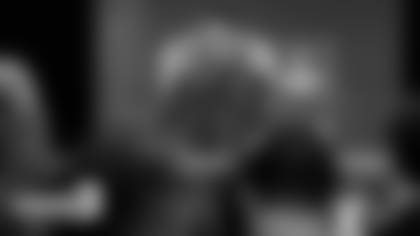Three Giants.com writers share their biggest takeaways from the Giants' 28-14 loss to the Bills in Week 2.
John Schmeelk: On the surface, the Giants' second loss of the season certainly wasn't as lopsided as their loss in Dallas. The Bills gained only 18 more total yards than the Giants and didn't eclipse 400 yards of offense. But the defensive performance still wasn't nearly good enough.
There are ways to win in the NFL if you lack a dominant defense. Teams can give up yards but take the ball away, setting up easy scores. Teams can give up yards but tiffen in the red zone and hold teams to field goals. Teams can be strong on third down. There are always key plays throughout a game that defenses can make to turn the tide. Right now, the Giants aren't checking any of those boxes.
The Giants have no takeaways through two games, and have four turnovers of their own. There were two Josh Allen tipped passes that seemed to float in the air forever, but Giants defensive backs couldn't get to them for interceptions. Pressures create takeaways. While the Giants had three sacks, there wasn't enough consistent pressure on Josh Allen.
Teams have gotten into the red zone six times, and scored touchdowns six times. It finally looked like the Giants made a stop against the Bills in the fourth quarter, but Dexter Lawrence committed an unnecessary roughness penalty on a field goal attempt, which gave the Bills a fresh set of downs. A touchdown shortly followed. On third downs, the Giants have allowed teams to convert 48 percent of the time, 24th in the league. The number would be even worse if Buffalo and Dallas weren't content to punt and just trying to run the clock out on the final couple of drives in their wins.
A defense can't struggle in the red zone, on third downs, and not produce any takeaways if it wants to give its team a chance to win games. Something has to give for it to turn around, and it has to happen quickly. Teams can recover and have meaningful seasons after 0-2 starts.
Dan Salomone: Janoris Jenkins was very quotable in the postgame locker room, but this one hit the nail on the head: "There were some bright spots, but we don't need bright spots. We need spots bright all day, every day. Everybody's got to come to play football." Pat Shurmur preached all offseason about the need to start fast, both within individual games and in terms of the overall season. Through two weeks, they have been able to do the former but not the latter.
In Dallas, a 59-yard run by Saquon Barkley led to an Evan Engram touchdown on the opening drive. In the home opener, the Giants marched 75 yards into the end zone on five plays, all runs. As of Sunday's slate, only the Giants and Ravens were two for two on first offensive possessions, which is usually an indicator of success. The top five teams in points off first drives last year were the Chiefs, Saints, Ravens, Colts and Patriots. The difference? All those teams were above 40 percent on third down, which has been one of the Giants' main problems. They have converted just five of 23 third downs (21.7 percent) and their average time of possession is 27:32. That will dim the lights on a Sunday.
Lance Medow: Explosive plays can be absolute killers to a defense and through the first two weeks of the season, that has proven to be true for the Giants. Teams' definitions of big plays vary, but for the sake of this exercise, I'm going with pass plays of at least 20 yards and runs for at least 10. In the first two games, the Giants have allowed 11 big plays (9 through the air, 2 on the ground). That includes three pass plays of at least 45 yards. Look around the NFL over the last few seasons and when you see the teams that have consistently ranked at the top of the league, a common theme is they typically prevent explosive plays.
Some defenses can survive with a "bend but don't break" approach, but the Giants have also struggled in the red zone. A week after the Cowboys went two for two in that area of the field, the Bills continued by capitalizing on all four of their trips inside the Giants' 20-yard line with touchdowns. One of the ways to combat some of these issues is through opportunistic plays, but the Giants have no takeaways through the first two games. Another tool is to be effective in making third down stops, but Dallas and Buffalo have combined to go 11 for 23 (48%) on third downs. That level of efficiency by their opponents puts the Giants tied for 25th in the NFL in third down defense.
The Giants' struggles in getting off the field on third down is a big reason why they have surrendered numerous lengthy touchdown drives. All five of Dallas' touchdowns came off drives of at least 75 yards and all four of Buffalo's scores were for at least 70. From the opposition's perspective, that's the ideal way to wear down a defense. As my colleagues outlined, there have also been similar issues on offense, but regardless of the offensive production, when your defense struggles to contain big plays, get off the field on third down, hold opponents to field goals instead of touchdowns in the red zone and surrenders an average of 31.5 points per game, it's very difficult to win games in this league.

Sign up for the Giants Newsletter
Breaking news and exclusive content direct to your inbox

















